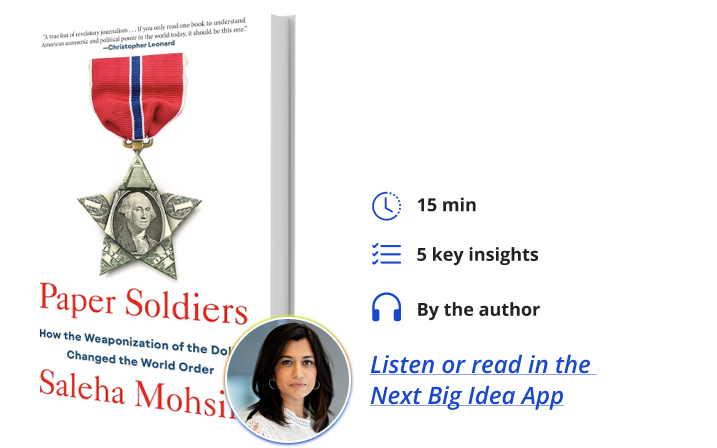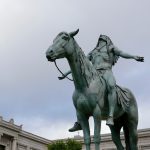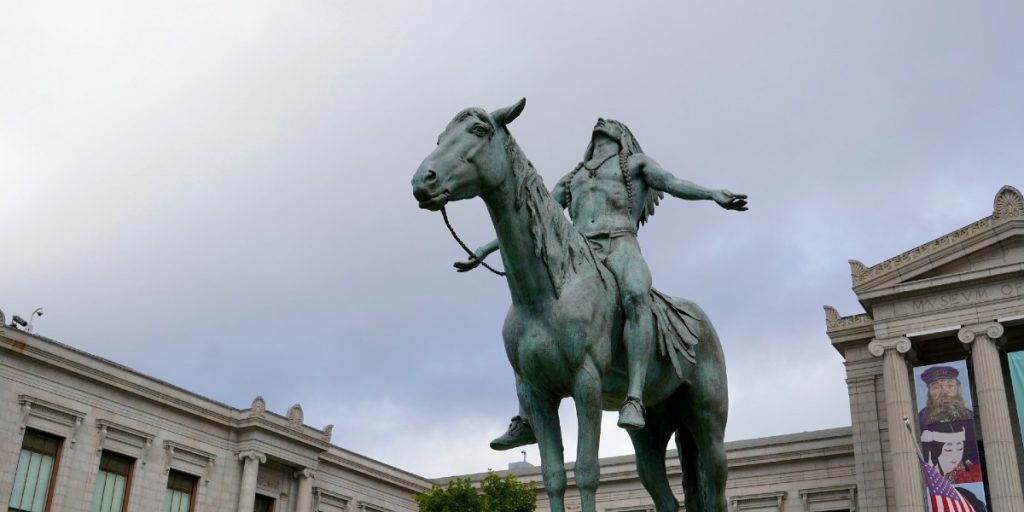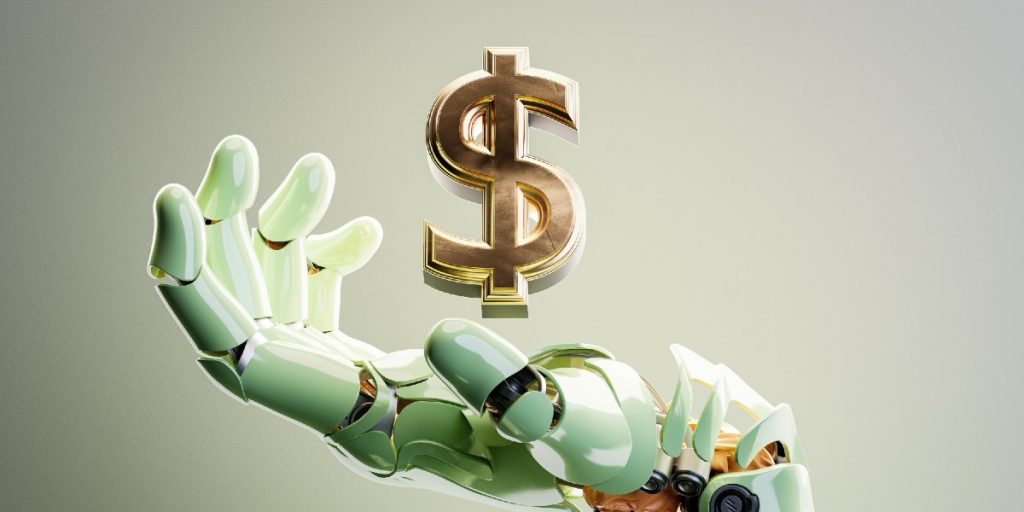Saleha Mohsin is the Senior Washington Correspondent for Bloomberg News, where she also hosts the Big Take DC podcast.
Below, Saleha shares five key insights from her new book, Paper Soldiers: How the Weaponization of the Dollar Changed the World Order. Listen to the audio version—read by Saleha herself—in the Next Big Idea App.

1. All empires think they’re special, and all empires fall.
This idea encapsulates the intellectual reason that I wrote this book. But what I didn’t discover until I had pretty much finished writing the book was that this line also encapsulates the personal reason I wrote the book.
Paper Soldiers is about the rise of America from a country that broke off from an empire and was expected to fail, and how it became a superpower. I tell this story through the lens of something that we all know and recognize: the U.S. dollar.
The intellectual, maybe unsurprising reason I wrote this book was that I have a keen interest in how economic policy is developed, touches our daily lives, and strengthens our nation. For me, that’s a story told through the power of the dollar and the problems that power brings. How is the dollar a symbol of the empire that the U.S. is? That’s a question I think about often.
“Paper Soldiers is about the rise of America from a country that broke off from an empire and was expected to fail.”
Here’s the juicy bit I realized only after I handed over the manuscript to my editor: My family history is intertwined with the aftermath of an empire coming apart. I discovered an innate fear of seeing the downfall of the nation I call home that goes beyond the bounds of everyday patriotism. You see, I grew up hearing stories from my parents about the India-Pakistan partition in the 1940s. It was an event that displaced some 15 million people, of which my grandparents’ families were among those. It all started with the fall of the British Raj in India. It was messy and turned wealthy families into refugees. It took decades and migration across multiple countries and continents before my parents fully recovered.
Now, in 2024, we hear everyone talking about the diminishing power of the superpower nation they made their new home. I find that terrifying. Maybe it just won’t happen because America is too great to fall. But as I wrote, all empires think they’re special, and all empires fall.
2. Faith in democracy and faith in markets go hand in hand.
This is the narrative arc of Paper Soldiers. It also might be the theme with which I’ve pursued my reporting at Bloomberg News for years now: The United States sets the standard for a healthy democracy.
Our democracy is a strong one because we have a rule of law. We’re not run by a dictator; rather, we have free and fair elections, independent courts, and a checks and balances system. This has given the U.S. immense power. That strength and stability extends to our economy, our businesses, and our stocks, bonds, and currency markets. Because of this strength and stability, foreign countries and businesses want to invest in our country. That allows us to spend big money on healthcare advances, technological advances, and military power.
Because there is so much faith in U.S. democracy, the world relies on our financial markets for profit and safety when crisis hits. Instability in our democracy might trigger a financial and economic meltdown on a global scale.
Faith in democracy and faith in markets go hand in hand aren’t my words. This is a line that Bob Rubin, the Clinton-era Treasury Secretary, wrote in an op-ed after the January 6th insurrection. In eleven words, Rubin summarized why damage to the nation’s electoral process was bad for the U.S. and global markets–bad for everyone.
3. The U.S. dollar is a weapon.
The world runs on dollars. From Russian oligarchs to the workers plucking cocoa beans in Ghana, everybody needs the almighty buck. Pretty much all of the world’s commerce happens as financial transactions with the dollar at the center of the global economy.
The U.S. has turned the dollar into a potent weapon. It helped protect us from further terrorist attacks in the wake of 9/11. When Iran was purportedly posing a nuclear threat to the world, the U.S. cut most of that country off from the dollar (meaning the whole global financial system) to bully them into submission.
“It helped protect us from further terrorist attacks in the wake of 9/11.”
In 2024, we might be seeing this weapon overused. After the Russia sanctions (one of the largest economic sanctions packages ever levied), it’s not just America’s adversaries that are wondering if perhaps they’re too dependent on the American dollar to trade with their partners. Even America’s friends are wondering if they might end up being bullied. This concept is called de-dollarization. It’s one small sign that our country’s “superpower” status might be on shaky ground.
4. The next generation of U.S. leaders will probably face a different America.
The U.S. is in the midst of an especially challenging, self-critical moment. Globally, we’re seen as an increasingly unreliable superpower. We’ve surprised the world by breaking with some long-held traditions: commitment to globalization, questions around the validity of a presidential election, repeated attempts to impeach presidents—a lot of which is rooted in deep partisanship. It’s unclear whether it’s short-term or long-term damage, but our global standing right now is somewhat diminished.
We’ve also weaponized our strength to what might be a tipping point. Did the U.S. go too far in bullying Russia into adhering to American foreign policy interests? That debate is raging in political and economic circles. It’s even making its way onto the campaign trail as we see two presidential candidates paint a picture of what the next four years should be like.
And oh, there’s that $34 trillion deficit that we’ve got to manage, a job made much harder with Republicans and Democrats unable to agree on practically anything. One thing is certain: The next generation of U.S. leaders will need to calibrate their leadership to account for the shift in American power.
5. If our country is strong, no foreign threat can touch our superpower status.
Many of the vulnerabilities the U.S. faces today are unprecedented, but if you look at history, we’ve gotten through equally difficult moments.
The biggest threat to U.S. dominance is not from outside its borders but from self-inflicted wounds. Like when leaders in Washington fight over raising the debt ceiling to finance spending they’ve already agreed on. Or when our Supreme Court triggers questions about its own ethics. It’s making those overseas wonder if the U.S. should have as much global power as it does.
“Our economy is the biggest in the world, trillions of dollars ahead of the second biggest.”
If our country emerges from its current troubles having reinforced rule of law, the independence and ethical standards of our courts, and free and fair elections, then its global power will remain. The U.S. has too much going for it: Our economy is the biggest in the world, trillions of dollars ahead of the second biggest.
A forty-year veteran of the U.S. government and I were talking about all of this recently: How can the U.S. survive as a global power? What are the hurdles? He gave me a line from Shakespeare: The fault, dear Brutus, is not in our stars, but in ourselves.
The power to fix America’s standing is in the hands of American voters and leaders—not a threat from abroad.
To listen to the audio version read by author Saleha Mohsin, download the Next Big Idea App today:































